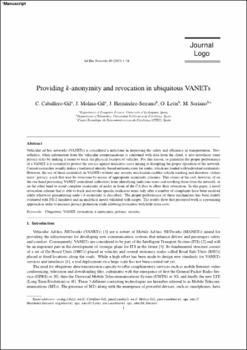Providing k-anonymity and revocation in ubiquitous VANETs
Date
2016Abstract
Vehicular ad hoc networks (VANETs) is considered a milestone in improving the safety and efficiency in transportation. Nevertheless, when information from the vehicular communica- tions is combined with data from the cloud, it also introduces some privacy risks by making it easier to track the physical location of vehicles. For this reason, to guarantee the proper performance of a VANET it is essential to protect the service against malicious users aim- ing at disrupting the proper operation of the network. Current researches usually define a traditional identity-based authentication for nodes, which are loaded with individual creden- tials. However, the use of these credentials in VANETs without any security mechanism en- ables vehicle tracking and therefore, violate users’ privacy, a risk that may be overcome by means of appropriate anonymity schemes. This comes at the cost, however, of on the one hand preventing VANET centralized authorities from identifying malicious users and revok- ing them from the network, or on the other hand to avoid complete anonymity of nodes in front of the CA thus to allow their revocation. In this paper, a novel revocation scheme that is able to track and revoke specific malicious users only after a number of complaints have been received while otherwise guaranteeing node’s k -anonymity is described. The proper performance of these mechanisms has been widely evaluated with NS-2 simulator and an analytical model validated with scripts. The results show that presented work is a promis- ing approach in order to increase privacy protection while allowing revocation with little extra costs.






